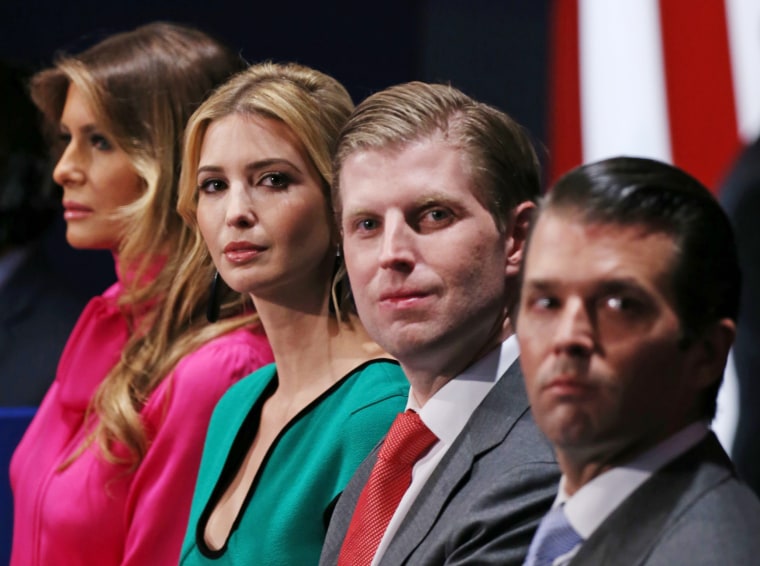Democrats are debating their path forward and who they want to fill the resulting power vacuum in the wake of Donald Trump's triumph over Hillary Clinton. Before Tuesday, it was predicted that Republicans would be the party facing an uncertain future.
Instead, it is the Democrats who are in dire need of post-election soul-searching. With the defeat of Clinton and the approaching departure of President Barack Obama, a leadership crisis has overtaken the party that many believed would win the White House. Progressives are seizing the opportunity to reform the Democratic National Committee, an entity that was criticized for its treatment of Sen. Bernie Sanders in primary.
Rep. Keith Ellison, who Sanders is backing for the role, has generated momentum in the contest for the chairmanship. Ellison said in July 2015 that Trump could defy the odds in the GOP primary. The prediction, which prompted disbelief at the time, is now being lauded for its insight.
Related: Could The Left Stage a DNC Coup? 'There Has to Be a Complete Restructuring'
The Minnesota congressman, who is Muslim, said Sunday on NBC's "Meet The Press" that the buzz surrounding his potential run should be a team effort that is greater than one person.
"Our job is to make sure that people know that the Democratic Party is the party that is going to deliver that for them," Ellison said. "And that means strengthening the grassroots. That means strengthening the local precinct county level and making sure that we're all channeled on massive turnout for that program."
Ellison asserted that the way forward was for Democrats to demonstrate that they could be the "champion" for working people.
"Every single Democrat in this country better be thinking the exact same way," he said. "How can we help the average American worker, you know, right out there, worrying about whether that plant's going to close. Fighting for them, standing up for them. That's what's the story."
New Jersey Sen. Cory Booker echoed this sentiment, saying that "neither party should be standing with pride and chest bumping" after the election.
"It reflects the fact that many people have a dissatisfaction with politics as usual," Booker said. "So I think this is a time where both parties should be humble, reach out to each other and try to find ways to build on common ground to serve the concerns, the rightful frustrations of the American people."
Related: Democrats Try to Salvage What They Can From Wreckage of 2016 Election
As the Democrats contemplate their future, questions have been raised about what will happen to Trump's business following the election. When Trump was asked in a primary debate whether his organization would be put in a blind trust should he win, Trump said that his oldest children could head the company.
"I don’t know if it’s a blind trust if Ivanka, Don and Eric run it,” Trump said last January. “I don’t know. But I would probably have my children run it with my executives and I wouldn’t ever be involved because I wouldn’t care about anything but our country, anything.”
However, financial experts dispute that leaving the company to his children would constitute a blind trust. In a blind trust, trustees have full discretion over assets, and the trust beneficiaries would have no knowledge of the holdings. "It's hard to see how you keep this wall between you and your children," Gary Hufbauer, a senior fellow at the Peterson Institute for International Economics, told NBC News. "It's hard to imagine that Trump wouldn't know what was going on with these properties, with how they are performing, if money is coming in or not, and decisions on buying new properties. There's not the same degree of ignorance you would have with a blind trust."
Josh Barro, a senior editor at Business Insider, shared similar analysis Saturday on MSNBC.
"Even if he had a disinterested party manage it, he'd still know what his assets were and he could undertake policies that would make those assets more valuable," Barro said. "Obviously his own children are not disinterested from him and they're likely to be simultaneously involved in the government at the time that they're managing the business."
In fact, Trump's three oldest children have been named part of his transition team, a temporary position. Federal law bars the appointment of family members and in-laws to cabinet and administration jobs, but Trump could potentially appoint his children or other family members to non-cabinet, non-federal employee positions.
Former New York City Mayor Rudy Giuliani, a top Trump surrogate who is reportedly being considered for a position in the administration, said Sunday on CNN's "State of the Union" that he did not see a conflict of interest for Trump's children to run Trump's business.
"It would seem to me that if he set up a situation in which the children were running it, there was a legal or clear document that meant that he would not be involved, he would have no interest in it, he would have no input into it, he would just have a passive interest, that would be the kind of thing that would work here," Giuliani said.
The former New York City mayor also argued that removing the siblings from the Trump Organization would leave them without a job.
Related: Conflict of Interest? How Will President Trump Manage His Business Empire?
When it was mentioned that the siblings were involved in the transition process, Giuliani said there was "no perfect way" to handle the company post-election.
"The blind trust solution isn't much better, meaning an independent trustee would run it," Giuliani said. "And any decision that he made, even if he didn't know it, that helped him, somebody would run it down and say, oh, my goodness, he may have made it for that reason. So, blind trusts aren't perfect either. This is a very special kind of situation."
